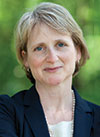Being named dean at the University of Wisconsin Law School was a tremendous honor and privilege. I am passionate about helping students from all walks of life join the legal profession and serve it with honor and joy. I was the first woman to serve as the dean of the U.W. Law School, and in my nine years in the job I often thought about what it means to be “first.”
 Margaret Raymond, Columbia Univ. 1985, is a professor of law and former dean (2011-2020) at the U.W. Law School.
Margaret Raymond, Columbia Univ. 1985, is a professor of law and former dean (2011-2020) at the U.W. Law School.
When I arrived at Wisconsin, I saw the photo display outside the dean’s office of all the individuals who had served as the dean of the law school. It was a wall of men. All of them were white men, until Daniel Bernstine, the first African-American dean of the law school, who served us so well from 1990 to 1997.
The photo of me is the first of a woman in the display. (Photos of deans are hung after the individuals are done being dean, so I saw that display of only men almost every day for nine years.) Although I generally don’t enjoy looking at pictures of myself, this one doesn’t bother me. I hope that it communicates a powerful message to students, faculty, and visitors that many different kinds of people can be law school deans and that it invites some of them to envision possibilities to lead – should they wish to – in that same way.
If you’re the “first” to be named to an existing position, you weren’t the first person who was qualified, or able, or the best candidate there ever was. You came along at a time when being the “first” was possible. I stand on the shoulders of the legions of remarkable, brave, intelligent, powerful, capable, and dynamic women who came before me – women who fought to be taken seriously, who struggled to get hired and promoted as law faculty members, who wound up in the academy because law firms would not hire them – who would never, in their time, have been named dean at the U.W. Law School.
This is not ancient history; many women around you remember those times well. And our profession still struggles to make the bar – let alone the academy – look like the world around us or the people we serve. I was very fortunate to have this opportunity, but I follow many people who would have welcomed it and excelled at it.
That legacy imposes a powerful obligation to me as a first: to help make other firsts possible. Other women helped pave the way, and I should do the same for the folks who come after me. Whether by means of providing support, encouragement, empathy, advice, or opportunities, it’s my responsibility to hold the door open for others. As a first, the best thing that can happen is for there to be a second and a third and for me to be the best possible colleague and friend to those who come next. When I lose count, I’ll know I’ve done my job.
» Cite this article: 94 Wis. Law. 88 (September 2021).
Meet Our Contributors
What was your oddest experience in a legal context?
 The oddest experience I ever had as a lawyer was when I was called for jury duty. Law professors never get on juries, so I was very excited when I was empaneled for voir dire in a criminal case. The case was the first prosecution under a new state statute that punished the offeror of a bribe, and it required proof not only that the defendant had done the prohibited conduct but that he knew it was unlawful.
The oddest experience I ever had as a lawyer was when I was called for jury duty. Law professors never get on juries, so I was very excited when I was empaneled for voir dire in a criminal case. The case was the first prosecution under a new state statute that punished the offeror of a bribe, and it required proof not only that the defendant had done the prohibited conduct but that he knew it was unlawful.
To the group of prospective jurors, the challenged conduct seemed pretty trivial, and they immediately started saying that they didn’t think it should be a crime. The prosecutor asked me several questions about what jurors were supposed to do when they disagreed with the law, encouraging me to say that the law required them to follow the court’s direction even if they disagreed with it. Meanwhile, the defense lawyer asked me questions to elicit how unusual it was for a criminal statute to require proof that the defendant knew the conduct was illegal. After a lot of talking, the court sent the whole panel out for lunch. I had high hopes, but on our return, I was immediately excused. Both lawyers later insisted they had not struck me from the jury. In retrospect, maybe the judge removed me for cause. Guess maybe I knew too much about criminal law!
Margaret Raymond, Dean Emeritus and Warren P. Knowles Chair, U.W. Law School, Madison.
Become a contributor! Are you working on an interesting case? Have a practice tip to share? There are several ways to contribute to Wisconsin Lawyer. To discuss a topic idea, contact Managing Editor Karlé Lester at (800) 444-9404, ext. 6127, or email klester@wisbar.org. Check out our writing and submission guidelines.
